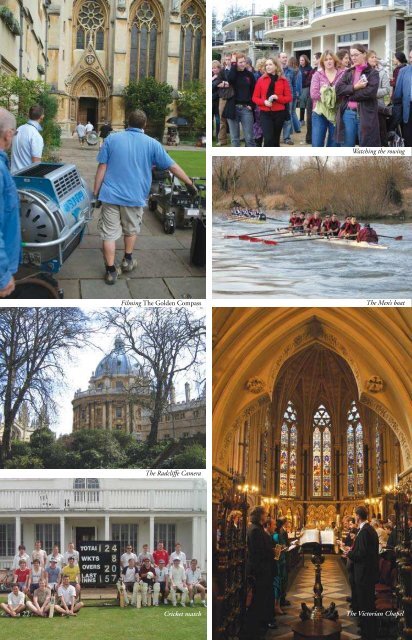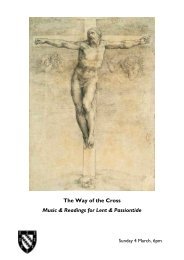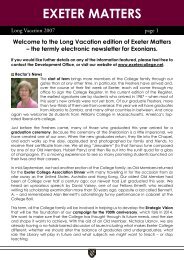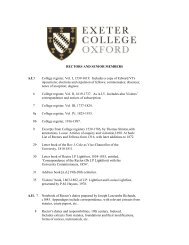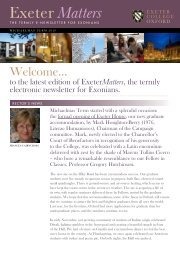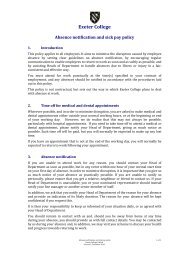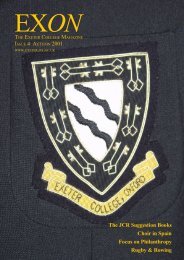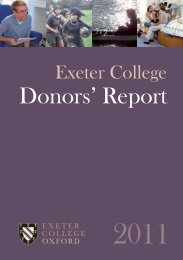Exeter Prospectus - Exeter College
Exeter Prospectus - Exeter College
Exeter Prospectus - Exeter College
- No tags were found...
You also want an ePaper? Increase the reach of your titles
YUMPU automatically turns print PDFs into web optimized ePapers that Google loves.
Filming The Golden CompassThe Radcliffe CameraWatching the rowingThe Men’s boatPhysicsTutors: Professor Andrew SteaneProfessor Frank CloseDr Jo DunkleyThe CourseThe physics course covers all aspects ofphysics, beginning with basic tools such asmechanics and electromagnetic theory, andgoing on to more advanced subjects suchas quantum physics. The central core of thecourse is taken by all students, but there isroom for flexibility in a wide choice of furtherpapers covering aspects of physics and itsconnection to other subjects. Examinationstake place at the end of every year. Thereis both a three- and a four-year course.Applicants may apply for either; the finaldecision between these courses is typicallymade during the 2 nd or 3 rd year. The 4th yearis intended as a preparation for research; itincludes project work and special subjectsinvolving advanced study in fields closelyrelated with current research in Oxford. Forfurther information, see the department ofphysics web site.The <strong>College</strong> encourages applications fromcandidates wishing to read Physics andPhilosophy.Prof. Steane researches in quantumcomputing. Prof Close is a theoretical highenergy physicist working on the quark andgluon structure of matter.CareersThe subsequent careers of <strong>Exeter</strong> Physicsgraduates form a very wide spectrum. Mostfall into one of three broad groups: (i) workin industry or in management consultancy;(ii) commerce, either directly or followingprofessional training, for example inaccountancy; (iii) research for a higher degreein Oxford or elsewhere.AdmissionThe <strong>College</strong> admits, on average, sixundergraduates a year to read Physics,and one or two to read Physics andPhilosophy. Candidates should offer Alevels in Mathematics and Physics. FurtherMathematics is preferred, but potentialcandidates having the necessary aptitude, forwhom this option is not available, shouldnot be deterred. Additional A levels in nonscientificsubjects are welcome as evidence ofall-round ability.Physiological Sciences(Medicine)Pre-clinical Tutor:Professor Richard D Vaughan-Jones(Physiology & Pharmacology)Pre-clinical lecturers:Dr John Parrington (Biochemistry &Endocrinology)Dr Alex Ashley (Anatomy)Dr Reuben Johnson (Neuroanatomy)Dr Martin Bracewell (Neuroscience)Dr David Greaves (Pathology,Immunology & Cell Biology)Clinical Tutors:Dr James KennedyDr Andrew FarmerClinical Professor:Professor Hugh WatkinsThe CourseStudents spend three years at Oxford in preclinicalstudy. They then move to one of threenational clinical schools for a further threeyears of training. About 50% of Oxford preclinicalstudents enter the Oxford clinicalschool, which is based at the John RadcliffeHospital, while the others enter clinical schoolin Cambridge or London. Students studyingpre-clinically at Oxford and Cambridgecompete for entry into their chosen clinicalschool, although there are sufficient clinicalplaces to accommodate all students. Thepre-clinical course at Oxford requires thatstudents study not only for their pre-clinicalqualification (1st BM), but also read for anHonours Degree in Physiological Sciences.The first five terms of pre-clinical study lead tothe 1st BM which is the national qualificationrequired for entry into clinical school. Theremaining four terms are spent studying for thePhysiological Sciences (BA) degree.The Honours course in Physiological Sciencesenables a the student to choose various aspectsSir Roger Bannister,neurologist and the firstman to run a mile inless than four minutes,was an undergraduateat <strong>Exeter</strong> <strong>College</strong>and subsequentlyheld the AmeliaJackson studentship.Interviewed by the BBCon the 50th anniversaryof his athletic triumph,Bannister was askedwhether he looked backon the 4-minute mileas the most importantachievement of his life.Bannister replied thathe saw his subsequent40 years of practisingas a neurologist asmore significant.22Cricket matchThe Victorian Chapel23


